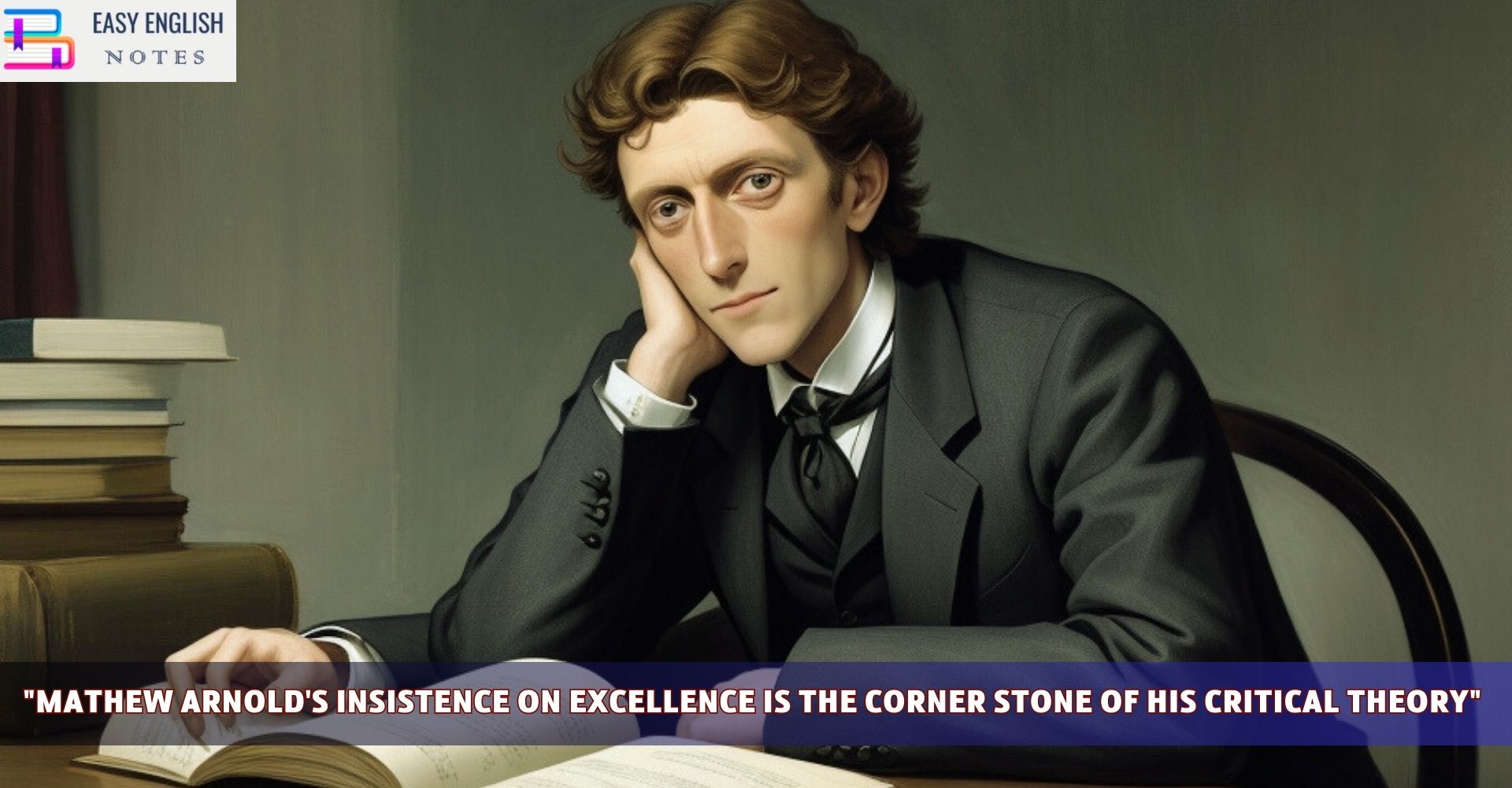“Mathew Arnold’s Insistence On Excellence is the Corner Stone of his Critical Theory” The distinction between excellent and inferior, sound and unsound, true and untrue, is of paramount importance. In poetry, as a criticism of life under the conditions fixed for such a criticism by the laws of poetic truth and poetic beauty the spirit of the human race will find its consolation and stay. But the consolation and stay will be of power in proportion to the power of criticism of life. The best poetry is what we want: the best poetry will be found to have a power of forming sustaining and delighting us, as nothing else can. A clearer, deeper sense of the best in poetry, and of the strength and joy to be drawn from it, is the most precious benefit which we can gather from a poetical collection. And yet in the very nature and conduct of such a collection there is inevitably something which tends to obscure in us the consciousness of what our benefit should be, and to distract us from the pursuit of it. We should therefore steadily set if before our minds at the outset, and should compel ourselves to revert constantly to the thought of it as we proceed.
Arnold makes it clear that a sense for the best, the really excellent, and of the strength and joy to be drawn from it, should be present in our minds and should govern our estimate of what we read. He however cautions that this real estimate, the only true one, is liable to be superseded by two other kinds of estimate, the historic estimate and the personal estimate, both of which are fallacious. A poem may count to us historically, it may count to us on grounds personal to ourselves. The course of development of a nation’s language, thought and poetry, is profoundly interesting, and by regarding a poet’s work as a stage in this course of development we may easily bring ourselves to make it of more importance as poetry than in itself it really is. So arises in our poetic judgement the fallacy caused by the estimate which we may call historic.
Also Read :
- Compare Hamlet with Macbeth, Othello and other Tragedies
- “The Pardoner’s Tale” is the finest tale of Chaucer
- Prologue to Canterbury Tales – (Short Ques & Ans)
- Confessional Poetry – Definition & meaning
- Line By Line Explanation Of The Poem The Eve of St. Agnes
It is evident how naturally the study of the history and development of a poetry may incline a man to pause over reputations and works once conspicuous but now obscure. The French have become delight students of their own early poetry, which they long neglected. The study makes many of them dissatisfied with their so-called classical poetry.
Everything, Arnold asserted, depends on the reality of a poet’s classic character. If he is a real classic, if his work belongs to the class of the very best then the great thing for us in to feel and enjoy his work as deeply as ever we can. This is what is salutary this is what is formative: this is the great benefit to be got from the study of poetry. Everything which interferes with it, which hinders it, is in furious. It may be said that the more we know about a classic the better we shall enjoy him; and, if we lived as long as Methuselah and had all of us heads of perfect learners and wills of perfect steadfastness, this might be true in fact as it is plausible in theory. The idea of tracing historic origins and historical relationships cannot be absent from a compilation. Moreover, the very occupation with an author, and the business of exhibiting him, disposes us to affirm and amplify this importance. Indeed there can be no more useful help for discovering what poetry belongs to the class of the truly excellent, and can therefore do us most good, than to have always in one’s mind lines and expressions of the great masters, and to apply them as a touch stone to other poetry.
Arnold is commonly thought of as the apostle of culture and of poetry, but to him religion was the highest form of culture and of poetry. The highest art, he says, the art of Phidias, of Dante, or of Michelangelo. is an art which by its height, depth and gravity possesses religiousness. Poetry passes into religion on its highest level, and religion must pass into. poetry in order to penetrate and transform that poor inattentive and immoral creature, man. “The full perfection of our humanity- that was Arnold’s lifelong quest and he sought it with the sensibility of a poet who lived at close quarters with the dismal and illiberal life of philistine England.
PLEASE HELP ME TO REACH 1000 SUBSCRIBER ON MY COOKING YT CHANNEL (CLICK HERE)











